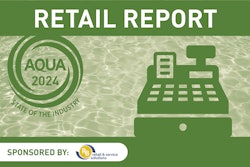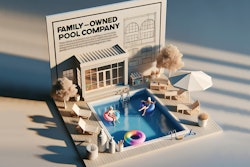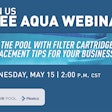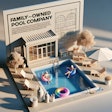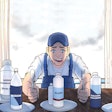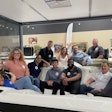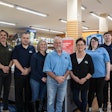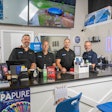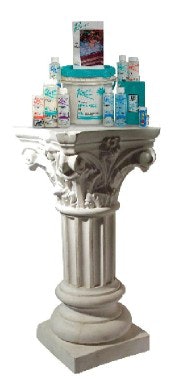
It's impossible to walk into a spa dealership without noticing the rows of matching products meant to take the mystery out of keeping the spa water sparkling clean. There are sanitizers, clarifiers, balancers and so on. If you really look at the packaging, all the products lined up next to each other look an awful lot like personal-care products — coincidence?
Chemical manufacturers have gone to a great deal of trouble in the last few years both redesigning and launching spa chemical systems. Selling the chemicals as a system is nothing new, but how much of the practice is an effective marketing tool and how much is sound science? Turns out it's a little bit of both.
Marketing MagicJust as personal-care products undergo periodic repackaging, so too do spa chemical lines. Leisure Time, manufactured by Advantis Technologies, recently went through a repackaging and rebranding to update the bottles in that line. "What happened over the years is, while the image of the brand and the popularity and quality of the brand continued to become recognized and increase, the packaging just became dated," says Michael Moore, vice president of marketing for Advantis. "We upgraded the packaging to give it more of a higher-end image and more of a personal-care product feel. If you look at Leisure Time today versus Leisure Time the way it was in 2003, it's a 180 degree turn on the look of the bottle, the look of the brand overall, the presence on the shelf." Does giving the entire system a facelift pay off. "It's made a huge difference," says Moore. "Sales have grown doubledigits since we've made the change. The actual formulations for the key products have not changed — they were always there."
Though we all know it's what's on the inside that counts, modernizing the packaging may be more important than you think. "I know that we've done a lot of work on our packaging on all of our products, including the spa products," says Rick Lockett, general manager for Vanson HaloSource's SeaKlear line. The company recently introduced a whole new spa chemical line, rather than introducing products individually. "We spent a lot of time going into this launch making sure that our packaging was very high quality, unique looking, that it had the right look and feel for a spa chemical product — it is important. Our sales are on track in two years to double. And I certainly wouldn't say that's all the packaging, but that's one of the key components." The company chose to launch a whole new line of chemicals largely because it recognized that systems sell, according to Lockett.
"When you offer chemicals in the spa industry, it's a bit different than on the pool side, because dealers, and consumers, tend to like to buy all one brand," he says. "They like to have a system, and understand, 'Hey, this is what I'm supposed to do,' and they like to buy everything all together. While we had Get With The Program Why sell a product when you can sell a system. quality solutions to some of their problems, we weren't getting out to the whole marketplace because of the fullline mentality that both the dealers and consumers tend to have. And so in order to really get our solutions out into wider distribution and to solve more problems for spa owners, it's necessary to offer that complete solution."
Customers not only look for matching bottles when they buy their chemicals, but manufacturers say that once they choose a particular brand, they also tend to stick with it. "The overall brand becomes what they look for within the store," says Scott Newton, marketing manager for BioGuard. "They know that brand; they become comfortable with that brand; they trust that brand; they trust their dealers that support that brand. So that becomes important to them. It's much like you use Kleenex or Puffs or any other major brand of tissue. That becomes what you are comfortable with; there are certain characteristics, and people become comfortable with-in their particular program.”
Sound ScienceNo one would say that how a brand is packaged and marketed isn't important, but the selling of the system is only possible because all the products are specifically formulated to go together.
"It's not only a marketing tool — it's technically correct what we're telling them to do," says Newton. "We've taken how to technically keep your the spa water treated optimally, but we've put it in an easy-step system. Anytime you start talking about chemistry, most consumers' eyes roll back into the back of their head and they go, 'Oh, this is going to be difficult.' So what we don't want to do is make anything seem difficult on something you want to enjoy. So it's technically sound, the approach, but we simplified it for the consumer so it doesn't become daunting."
Regardless of the type of system they choose, consistency within that system is key, says Buck Hall, director of sales, Arch Chemicals.
"Basically what we're looking for is dependable results for the consumer," he says. "With different systems, there are different technologies of products. You could have compatibility issues with the different technology, so when you sell it as a system, you're assured that you're getting the compatibility of the different technologies."
Without the sound science, no amount of great marketing would matter, adds Hall. "I think that marketing purposes complement the technology in the system more so than the other way around," he says. "When the technologies are put together, the marketing then goes to support those types of technologies. There's not a lot of smoke and mirrors with the marketing; it is directly related to the type of technology and what the results are for the consumer."
Lockett agrees that selling chemicals as a system involves both science and salesmanship. "Well, it's probably equal parts, but one of the things I caution on is that with some of the systems out there, certain things are incompatible, and that's one of the other factors in the spa business that tends to keep people locked into one brand," he says. "There are certain types of systems that are not compatible with others, like a biguanide sanitizer is not compatible with some of the chemicals used in a bromine system, for example. And so some of it is marketing, and some of it is necessity, because the chemicals really don't work together."
Good For The DealerEven with science backing up the system and dynamic marketing tools in place, the dealer's role in selling the system cannot be understated. "The dealer is extremely important to the consumer, because the consumer usually is coming in blind," says Newton. "They understand putting gasoline in their car and oil and all that stuff, but when it comes to a spa, they rely greatly on dealers and the recommendations they make."
Being knowledgeable about the products and explaining to your customers why they work together also makes the purchase of both spa and chemicals easier for them. "What it does is it takes the intimidation factor away from owning a spa," says Newton. "So I'm making a large-value purchase for myself to have and enjoy, and the big question I have in my head is, 'How hard is it to maintain the water the way I want it.' In the system approach, dealers are correct in saying, 'Let's talk about the way you want to use your spa, your use patterns and everything, and let's give you a system that's very easy to maintain, and it takes the nervousness out of the consumer. It makes it easier for the dealers to sell the the spa, because it takes the fear of treatment out of it."
Many dealers, both to ease customers' minds about the difficulty of maintaining their new spa, and also to engender a repeat customer, will give away a start-up kit of chemicals to new spa buyers. "When they sell a hot tub to a new consumer, a lot of the retailers will put a kit in the tub and give that kit away free," says Moore. "Those kits include all the chemicals necessary to start up the tub and use it for two to four weeks.
"So it gets them started and it gets them exposed to a brand that the dealer stocks. Three weeks later, when the consumer needs more product, they come back to the store, and that dealer will be carrying those same products. The advantage to the dealer is they've got a happy customer; they've got a customer that will now believe in them because they've now proven themselves. At the same time, they're using the system; they will lock that customer into coming back to them and buying that product from them again."
Good For The ConsumerSelling an entire system is not only good business for dealers, but also good sense for customers. "The people who are selling the spa are typically going to be the same people who are selling the chemicals afterwards," says Lockett. "Selling the system keeps the customers coming back, and from a more altruistic standpoint, if they sell them on the right system, the spa owner is going to be much happier with that spa, and so they're going to have a much happier customer."
Most customers also don't want to become chemical experts, adds Moore; they just want to enjoy their new spa, and the systems help them do that. "If I spent $10,000 on a tub, and I didn't know anything about chemicals or anything about a hot tub, and the dealer says, 'Look, here's this tub, and I'll tell you what I'm going to do. I'm going to give you this free start-up kit.' I'm going to go home, I'm going to fill my tub, and follow the directions and when everything works right, I'm not going to change anything. Because I just spent $10,000 on this tub; I don't want to become a chemist, having to learn how to care for something that I bought to relax in. They systems make it the least amount of hassle possible."
Why companies encourage dealers to sell spa chemicals as a system comes down to just one reason, according to Newton: consumer simplicity. "I think that most consumers, one of the questions they don't have is how they're going to enjoy [the spa]. One of the questions they do have is how they're going to treat it to keep it looking the way they want. And our job as a manufacturer is to make that process as simplified as possible."





















